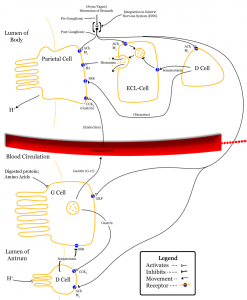Low stomach acid is a serious condition.
Stomach  acid enables breakdown of food. Stomach acid is the second stage of digestion, after chewing. Very high levels of acid, pH 1–2, are very important for this process. Strong stomach acids:
acid enables breakdown of food. Stomach acid is the second stage of digestion, after chewing. Very high levels of acid, pH 1–2, are very important for this process. Strong stomach acids:
- Ionize minerals to supply mineral and primitive amino acids;
- Kill bacteria, parasites and organisms in food to protect the body from invasion;
- Supplies acid enable the liver to dump toxins.
Insufficent stomach acid, hypochlorhydria, enables bacteria, and other organisms to survive. During digestion, these organisms ferment food and create carbon dioxide. This flow carries or percolates, gastric acid and food back up the esophagus which causes discomfort, and eventually damages tissues in and near the upper digestive tract.
Symptoms and effects:
- Weak, but still caustic, stomach acid irritates the esophagus causing heartburn;
- Cases excessive burping or belching;
- Acid Reflux or GERD, or Gastroesophogeal reflux disease;
- Chronic esophogeal irritation results in weakened tissue, resulting in structural dysfunction or hiatus hernia;
- Persistent irritation can result in malignancy or esophogeal cancer.
Persistent, chronic, weak stomach acid leads to often serious health consequences resulting from chronic stress metabolism which diverts chorides needed for digestion to other metabolic roles.
What Causes Hypochlorhydria?
In simple terms, any form of biological stress. Did you ever notice:
- Digestion stalls immediately with emotional or physical challenge?
- Nausea often accompanies prolonged stress?
Chloride serves many roles in the body:
- Primary agent for Hydrochloric Acid, HCL, in the stomach to digest food;
- Secondary oxidation agent as a backup to oxygen to burn off (oxidize) toxins;
- Cellular Neutralization of persistent toxins;
- General electrolyte.
Dr. Emmanuel Revici documented that most, if not all, pathogenic cells absorb chloride into the double bonds of unsaturated fatty acids.
Revici correlated chloride stress physiology to both:
- Systemic chloride depletion resulting in insufficient stomach acid;
- Appearance of chlorine oxidized lipids on the surface of the intestine resulting in bowel dysfunction, often diagnosed as diverticulitis and Chron’s disease;
- Medical Shock, resulting in reduced blood flow, and dysfunction in the upper small intestine which
- As a result of stress.
For the purposes of this paper, stress results in a sequence of digestive dysfunctions which worsen depending on both severity and duration of the stress:
- Phase 1 — Loss of stomach acid (Depletion of chloride available to the stomach for digestion);
- Phase 2 — Intestinal inflammation (Accumulation of chloride oxidized lipoids on the surface of the intestines).
For More information see Stress Main Page.

![500px-Shock-cell2[1]](http://whnlive.com/stress/wp-content/uploads/sites/14/2011/09/500px-Shock-cell21.png)